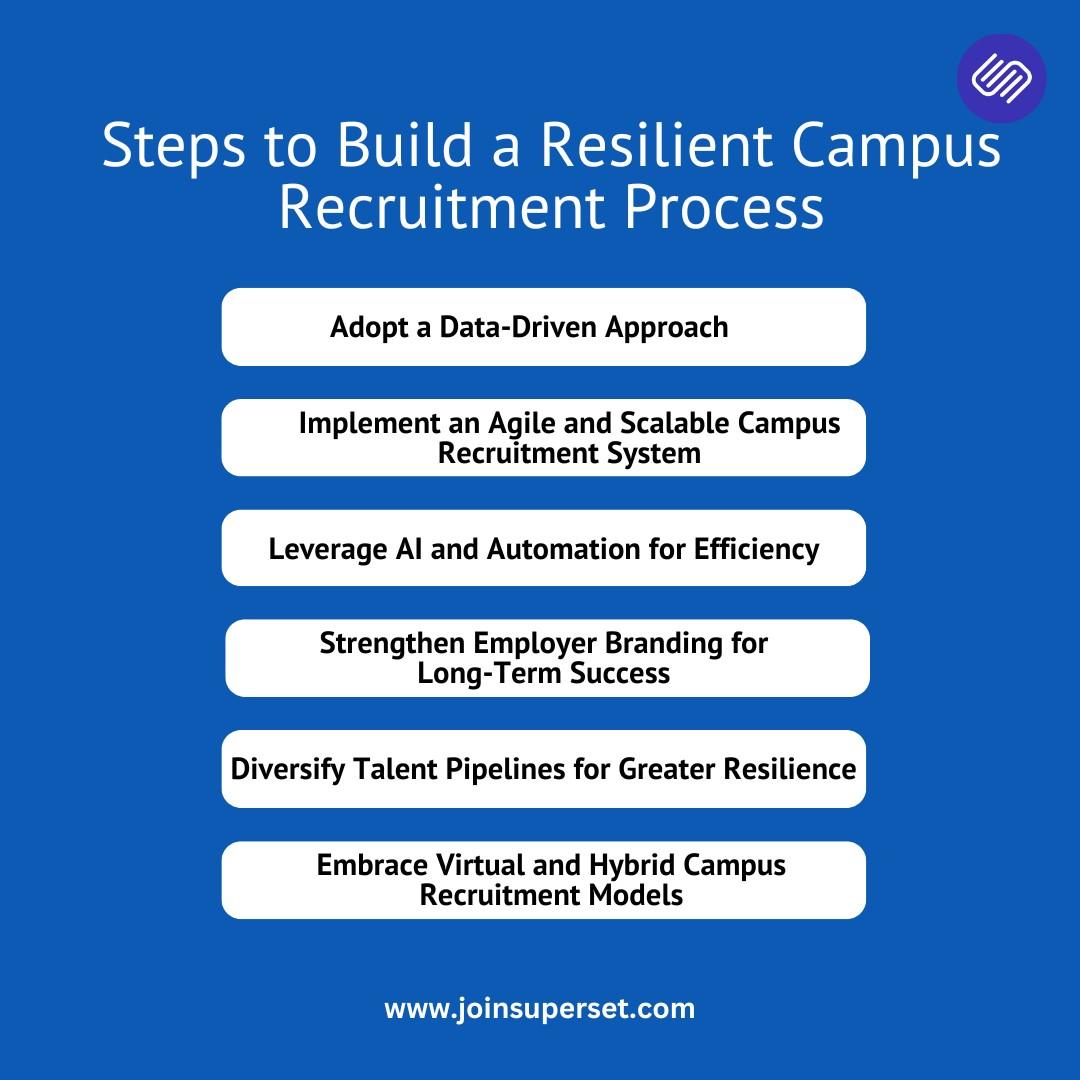In an ever-evolving job market, where technological advancements and shifting economic landscapes dictate hiring trends, building a resilient campus recruitment process is essential for companies seeking to secure top-tier talent. As organizations face increasing uncertainty and changing workforce demands, leveraging an agile and adaptable campus recruitment system can help companies maintain a competitive edge. Superset, an industry-leading platform, offers campus hiring solutions that enable companies to automate, streamline, and personalize their campus hiring process while preparing for market fluctuations and talent shifts. This article explores actionable strategies and best practices to create a future-ready campus recruitment process that can withstand volatility and ensure long-term success.
Why Building a Resilient Campus Recruitment Process is Essential
In today’s rapidly changing job market, a traditional campus recruitment process is no longer enough. Factors like economic shifts, emerging technologies, and changing candidate expectations require companies to adopt a more flexible and scalable approach. A resilient campus recruitment system helps companies:
- Adapt to Market Changes: Quickly adjust hiring strategies based on economic conditions, whether during slowdowns or rapid growth.
- Maintain Talent Quality: Consistently attract and recruit top talent, even when talent availability fluctuates.
- Ensure Operational Continuity: Automate workflows and efficiently manage high volumes of applications to prevent process disruptions.
By investing in a resilient campus hiring process, companies can stay competitive and future-proof their recruitment efforts.
Key Challenges Affecting the Campus Recruitment Process
1. Market Volatility and Economic Uncertainty
Economic downturns or sudden growth spurts can drastically impact hiring needs. Companies that rely on rigid, manual processes struggle to adjust recruitment volumes or timelines effectively.
2. Shifts in Candidate Preferences
Gen Z candidates value flexibility, work-life balance, and purpose-driven careers. Companies that fail to align their campus hiring process with these expectations risk losing high-potential talent.
3. Increased Competition for Top Talent
As companies increasingly vie for the same pool of fresh graduates, organizations need to differentiate themselves through an efficient and engaging campus recruitment system.
4. Technology Disruption in Recruitment
Automation, AI, and virtual hiring platforms are transforming the campus recruitment process. Companies that do not leverage these technologies risk inefficiencies and slower hiring cycles.
Steps to Build a Resilient Campus Recruitment Process

1. Adopt a Data-Driven Approach
A data-driven campus recruitment process allows companies to make informed decisions by analyzing historical hiring trends and candidate performance. By leveraging real-time data and predictive analytics, organizations can:
- Identify High-Performing Universities: Focus recruitment efforts on institutions that consistently produce top-quality talent.
- Refine Job Descriptions: Optimize job descriptions to attract candidates with the right skills and cultural fit.
- Measure Sourcing Channel Effectiveness: Evaluate which sourcing channels deliver the best results and allocate resources accordingly.
This approach ensures continuous improvement and enhances the overall efficiency of the campus recruitment process.
2. Implement an Agile and Scalable Campus Recruitment System
To handle unpredictable market conditions, companies need a campus recruitment system that can easily adjust to changing hiring demands. An agile system ensures that recruitment efforts can be quickly scaled up during high-volume hiring seasons or scaled down during slow periods.
Superset’s platform helps organizations achieve this by:
- Scaling Efforts Efficiently: Managing large volumes of applications seamlessly during peak hiring times.
- Automating Routine Tasks: Reducing manual workload by automating candidate screening and interview scheduling.
- Customizing Workflows: Allowing companies to tailor recruitment processes to match their unique hiring goals and preferences.
This flexibility ensures operational efficiency and consistency, regardless of market fluctuations.
3. Leverage AI and Automation for Efficiency
- AI-powered campus recruitment systems: improve hiring efficiency by automating repetitive tasks and enhancing decision-making.
- Resume Screening and Shortlisting: AI quickly scans and filters resumes, identifying candidates who best match the job requirements.
- Predictive Analytics for Candidate Suitability: AI uses data-driven insights to predict a candidate’s likelihood of success, helping recruiters make informed decisions.
- Personalized Candidate Communication: AI automates personalized emails and updates, ensuring timely and relevant communication throughout the campus hiring process.
This not only reduces time-to-hire but also improves the overall candidate experience, making the recruitment process faster and more effective.
4. Strengthen Employer Branding for Long-Term Success
- Building a strong employer brand: It is essential for a resilient campus recruitment process. When companies effectively showcase their values and growth opportunities, they attract high-quality candidates who align with their mission.
- Highlight Company Culture: Emphasize the organization’s values, work environment, and career progression opportunities during recruitment drives to create a positive impression.
- Engage Through Pre-Placement Talks: Conduct webinars, workshops, and alumni interactions to engage with potential candidates and provide insights into company life.
- Showcase Success Stories: Share testimonials and career growth stories of past campus hires to build trust and inspire confidence among new candidates.
A strong employer brand not only attracts top talent but also improves offer acceptance rates and long-term employee retention.
5. Diversify Talent Pipelines for Greater Resilience
A resilient campus hiring process focuses on building a diverse and inclusive talent pool to strengthen the workforce and drive innovation. By widening the talent pipeline, companies can better adapt to changing market conditions and ensure long-term success.
To achieve this, companies should:
- Partner with Diverse Institutions: Collaborate with universities from different regions and backgrounds to access a broader range of talent.
- Develop Outreach Programs: Design initiatives to engage underrepresented groups and encourage their participation in the hiring process.
- Use Blind Hiring Techniques: Implement anonymous screening methods to reduce unconscious bias and promote fair candidate evaluation.
By promoting diversity, companies can create a more inclusive and resilient workforce capable of adapting to evolving industry demands.
6. Embrace Virtual and Hybrid Campus Recruitment Models
Adopting virtual and hybrid campus recruitment models enables companies to expand their reach beyond physical boundaries, allowing them to tap into a larger and more diverse talent pool. This approach:
- Reduces Costs: Minimizes expenses related to travel, accommodation, and logistics for in-person campus drives.
- Improves Efficiency: Streamlines the interview and selection process through digital platforms, saving time and resources.
- Enhances Candidate Experience: Provides a smooth and engaging recruitment journey with seamless digital interactions, ensuring convenience for candidates and recruiters alike.
Leveraging these models ensures that companies maintain flexibility and scalability in their campus recruitment process while enhancing operational efficiency.
Enhancing Candidate Engagement During Market Shifts
Engaging candidates effectively during fluctuating market conditions is essential to maintaining a robust talent pipeline. Here’s how companies can keep candidates engaged:
- Maintain Transparent Communication: Keep candidates informed about recruitment timelines, potential delays, and next steps to build trust and reduce uncertainty.
- Offer Upskilling Opportunities: Provide pre-placement training and development programs that equip candidates with industry-relevant skills.
- Use Gamification to Sustain Interest: Gamify the campus hiring process by incorporating interactive assessments and challenges to keep candidates engaged.
Measuring and Refining Your Campus Recruitment Process
A strong campus recruitment process evolves by analyzing data and feedback to enhance efficiency. Companies should:
- Track Key Metrics: Monitor important metrics such as time-to-hire, offer acceptance rates, and candidate satisfaction to assess process effectiveness.
- Analyze Candidate Feedback: Collect insights through surveys and post-placement evaluations to identify areas for improvement.
- Refine Workflows Continuously: Use data insights to optimize and personalize recruitment workflows, ensuring a seamless hiring experience.
How Superset Helps Build a Resilient Campus Recruitment Process
Superset is a comprehensive campus recruitment system that empowers companies to navigate market uncertainties and talent shifts with ease. Here’s how:
- End-to-End Automation: From candidate sourcing to final selection, Superset automates the entire campus hiring process.
- AI-Powered Matching: Advanced AI algorithms ensure the best-fit candidates for your company’s requirements.
- Scalability for High-Volume Hiring: Superset’s campus hiring solutions can easily adapt to meet fluctuating hiring demands.
- Customizable Workflows: Tailor recruitment processes to align with unique company goals and timelines.
Conclusion
Building a resilient campus recruitment process is no longer an option—it’s a necessity. Companies that invest in adaptable and technology-driven campus hiring solutions can navigate market changes more effectively and secure the best talent for long-term success. Superset’s advanced platform equips organizations with the tools to automate, optimize, and personalize their campus recruitment system, ensuring seamless operations even during turbulent times.








